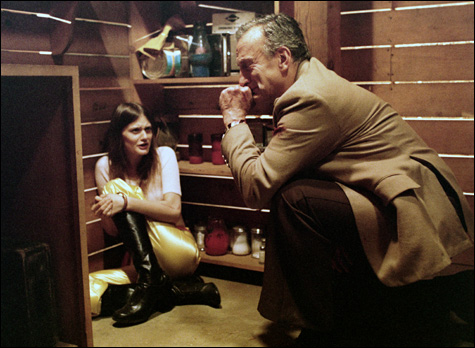
HARDCORE: George Scott transforms himself with alarming ease from a devoutly Calvinist Midwestern businessman into a porn-movie producer. |
| “The Style of Loneliness: A Paul Schrader Retrospective” | Harvard Film Archive: January 30–February 1 |
"I'm not sure what happened to me," says Paul Schrader's Patty Hearst, one of the least reliable of the director's succession of unreliable narrators, in the film named for her. Schrader — the subject of a retrospective this weekend at the Harvard Film Archive — doesn't deal in the kind of Hollywood psychology that explains people's actions in terms of devotion to a clear goal. Avowed motives and causes might do for a short plot description. (Hardcore: a father ventures into LA's sordid underbelly in search of his runaway daughter; Mishima: a famous novelist's obsession with what he sees as modern Japan's loss of honor leads him to commit ceremonial suicide.) But the films contradict such simplifications, taking off at tangents to their ostensible main impulses. Schrader's intellectual complexity sometimes leads to murkiness, but it's also yielded at least one superb film.Schrader will be present at this Friday's screening of MISHIMA: A LIFE IN FOUR CHAPTERS (1985; January 30 at 7 pm), which some consider his masterpiece. Ken Ogata's sober, recessive performance confounds expectations: moments of brazenness, of charm (such as the author's sardonic confrontation with left-wing students occupying a Tokyo University building), keep hinting at an underlying self-denial — more like absence of self than self-hatred — that links Mishima to other Schrader antiheroes. The subtlety of this conception of the character seems an unlikely basis for a feature film, but the idea doesn't have to fill a feature, since Schrader interpolates set pieces based on three Mishima works, each stylized in glowing colors and a theatrical mise-en-scène. Furnished with one of Philip Glass's most maddening scores, Mishima is both a grandiloquent and a circumspect work, in tune with the contradictions of a protagonist forever withdrawing from his own tragedy.
In the entertaining AMERICAN GIGOLO (1980; February 1 at 3 pm), the concluding homage (if that's what it is) to Robert Bresson's sublime Pickpocket is at odds with a movie whose logic is that Richard Gere must be punished for being too adept at trading on his good looks. The skepticism that is the keynote of Schrader's attitude toward Gere's high-priced gigolo results in a film that works as an ironic, disabused takedown of the LA of the period and also as (the embryo of) a dark frame-up thriller but falls short as the account of the redemption that comes the character's way via his affair with a senator's wife (Lauren Hutton). The gliding Steadicam shots and the production design combine with Giorgio Moroder's music to steep the characters in waves of free-floating hostility.
 Related
Related:
Save yourselves, Working man blues, How it feels to be something (back) on, More 
- Save yourselves
The media-propagated notion that the Canadian sextet Fucked Up are "saving hardcore" seems silly.
- Working man blues
Charlie Webster's war never ends.
- How it feels to be something (back) on
Sub Pop co-founder Jonathan Poneman still sounds amazed by the band he saw at Seattle’s Crocodile Café back in 1993.
- Excerpt: Patti Smith's Just Kids
The stars were lining up to enter the Ziegfeld Theatre for the glittering premiere of the film Ladies & Gentlemen, the Rolling Stones. I was excited to be there.
- Photos: Vanna and Our Last Night in Bangor
Photos of the two bands performing during the Skate Against Drugs 2010 Tour
- None More Black | Icons
Icons demonstrates just how little None More Black have changed over 10 years.
- Photos: Motherboar at Great Scott
Motherboar perform at Great Scott on January 22, 2011.
- A Deathwish comes true
If you've lived in Boston for more than a few months, you've surely felt the pang of "Whoa" that runs up and down your spine the first time you see their trucks: huge black-and-gold behemoths stocked with intimidatingly jacked dudes all dressed in black, blazing down the street like Mongol hordes on the rampage.
- How staying different saved street art in the Bean
Boston has a special place in graffiti history — and not just because one of our early marquee vandals, Popeye, was Jordan Knight of the New Kids on the Block.
- Death Ray Vision emerge from scrap metal
Metal, being a musical genre based on extremes, embodies an ongoing war between conservative and radical forces.
- After a decade on the grind, Trap Them find their stride
Hardcore cribbing from metal is hardly new territory. At least, according to Trap Them vocalist Ryan McKenney.
- Less

 Topics
Topics:
Features
, Entertainment, Movies, Symbionese Liberation Army, More  , Entertainment, Movies, Symbionese Liberation Army, Patty Hearst, Patty Hearst, Movie Reviews, George Scott, Robert Bresson, Willem Dafoe, Jean-Luc Godard, Less
, Entertainment, Movies, Symbionese Liberation Army, Patty Hearst, Patty Hearst, Movie Reviews, George Scott, Robert Bresson, Willem Dafoe, Jean-Luc Godard, Less 